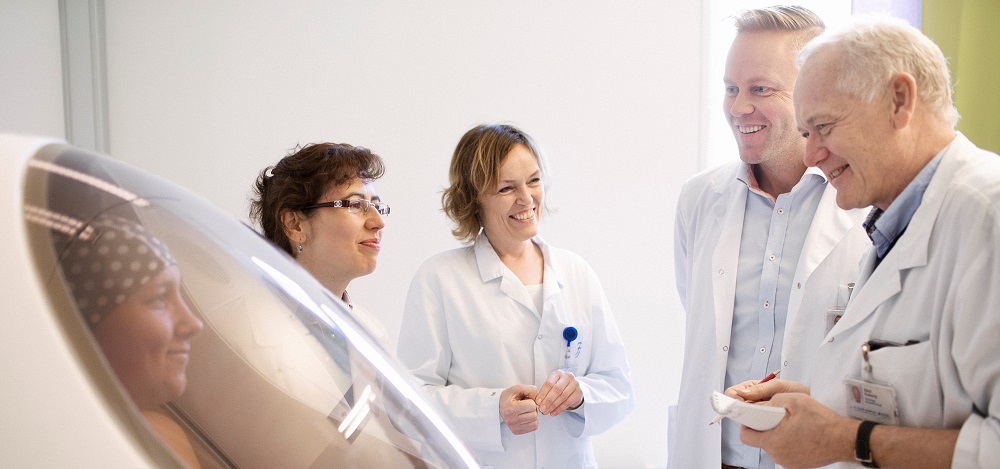Obesity
Obesity

Obesity is considered the greatest public health challenge of our time, which entails a risk of various additional diseases and health challenges, complications and increased societal costs.
In Norway, the incidence of obesity among adults has more than doubled over the past 20 years. Obesity is a complex disease with complex causes. There are genetic and epigenetic systems that are part of an interaction with environmental influence, living conditions and a social framework that determines behaviour. The obesity-related complications also develop through interactions between genetic and environmental factors, and their manifestations vary between individuals.
The obesity research group is interested in exploring the interactions and inequalities in obesity between individuals throughout the life course, developing and testing behavioral interventions for the prevention and treatment of obesity in both children and adults, and evaluating obesity-related public health initiatives. The goal of the research group is to achieve a better understanding of obesity by studying individuals' response to both surgical and conservative obesity treatment, as well as how primary care measures can help prevent obesity.
We have expertise in epidemiology, intervention studies, clinical studies, study management and qualitative research. Researchers in the group have various collaborations both nationally and internationally.
Teaching
The obesity research group leads the course Obesity and health in the Master's program in clinical health science. The group is responsible for three subjects in the program that concerns specifically obesity: 1. "Obesity epidemiology, pathophysiology and health consequences" 2. "Obesity treatment I – Nutrition, exercise and behavioral therapy for adults". 3. "Obesity treatment II - Surgery, drugs and children". It is also possible to take these subjects as continuing education courses for healthcare personnel.
Research topics
Childhood Obesity treatment
Childhood Obesity treatment
Eur-EVIRA: The main goal is to investigate whether standard treatment in the outpatient clinic is affected by additional digital support, in addition to the treatment in the clinic. The digital support involves, for the child, daily weighing at home so that they can follow their weight development via their mobile phone. We believe this can be of great help to parents so that the child's weight development can be monitored closely.
Bariatric surgery
Bariatric surgery
Studies on long-term follow-up after bariatric surgery. The purpose of the BAROBS project is to map the long-term effects of bariatric surgery in terms of duration of weight loss and improvement of obesity-related diseases. We are also investigating whether bariatric surgery can in the long-term lead to new morbidity due to deficiency conditions or other consequences of large weight loss and changes in body composition. Namsos Hospital, St. Olav's Hospital and Ålesund Hospital are participating in the project, which is led by the Regional Center for Obesity Research and Innovation at St. Olav's Hospital. BAROBS 1 has several publications. BAROBS 2 started up in 2023.
Bariatric surgery and pharmacokinetics of medications
Bariatric surgery and pharmacokinetics of medications
In BAR-MEDS, we examine whether the interventions gastric bypass and gastric sleeve affect the absorption of medicines. Surgery in the gastrointestinal tract can affect both pH, transit time and the area of the intestinal surface. These factors, and the subsequent change in body weight, have a potential impact on the dosage of drugs and whether this needs to be changed after the operation. Does bariatric surgery affect the body's absorption of medicines?
Prevention of type 2 diabetes among people with overweight and obesity
Prevention of type 2 diabetes among people with overweight and obesity
The VEND-RISK study followed participants at high risk for type 2 diabetes for five years from the time they started attending a Healthy Life Centre (Frisklivsentral) were they were offered physical activity and nutritional courses. The main aim of the study was to investigate whether it is possible to reduce the risk of developing type 2 diabetes in people who are overweight or obese. In autumn 2022 and spring 2023, data collection has been collected of participants in a follow-up 10 years after they started (VENDRISK OPPFRISK). The study has several publications. Read more about the VEND-RISK study.
Bariatric surgery and oral health
Bariatric surgery and oral health
Obesity in itself is associated with poor oral health, but bariatric surgery is likely to have a further negative impact. The mechanisms behind this may include both systemic effects associated with the surgery and changes in eating and drinking behavior. We are investigating this with different methodological perspectives. More information is available at www.bar-oral.no
Ketogenic diets
Ketogenic diets
Carbohydrate intake, ketosis and appetite suppression during weight loss. Being in ketosis prevents the increase in hunger feelings and ghrelin secretion otherwise seen with weight loss (Nymo et al, 2017; Lyngstad et al, 2019). Our research group is now trying to identify the maximum threshold of carbohydrate intake still associated with ketosis and appetite suppression (no increase in hunger feelings or ghrelin secretion) in low-energy diets.
Media (Norwegian articles)
School meals - an opportunity to even out social inequalities in health (adressa.no, 04.12.2023)
Towards buns and soft drinks in Norwegian hospitals (nrk.no, 26.09.2023)
Bariatric surgery patients need more follow-up (nrk.no, 22.09.2023)
Norwegians have bought diet pills for over 420 million (nrk.no, 30.08.2023)
In free fall after the weight loss (adressa.no, 07.07.2023)
Toril became an alcoholic after bariatric surgery (nrk.no, 15.05.2023)
Long-term follow-up reduces the risk of diabetes (forskning.no, 22.03.2022)
